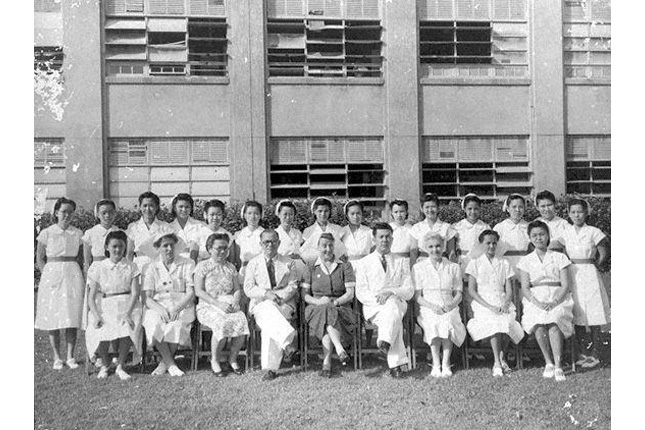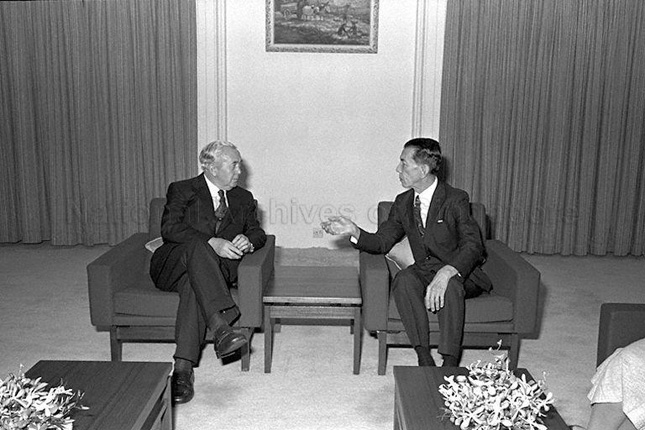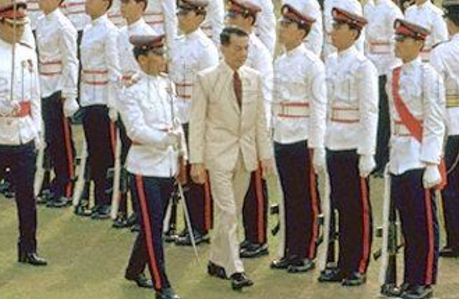Last month (Nov. 2016), Members of Parliament (MPs) passed the Bill to amend Singapore’s Constitution, which effected changes to our Elected Presidency (EP).
77 Members of Parliament (MPs) gave their approval, while all six MPs from the opposition Workers' Party (WP) voted "no".
A mechanism, known as the Hiatus-triggered model, was introduced to ensure that we will have an EP from a minority community, if there hasn’t been one from that community in a while (30 years to be exact).
Among Singapore’s smallest minority communities are the Eurasians.
To give you a better idea of how small the community is, under our CMIO (better known as the Chinese, Malay, Indian and Others) model that lists the various ethnic communities from largest to smallest, Eurasians fall under Others.
While we now know that the next Presidential Election (PE) will be likely reserved for candidates from the Malay Community, it may be some time before the PE is reserved for Eurasian candidates.
Singapore’s last Eurasian president, Benjamin Sheares, was the country’s second president in its history. A medical doctor by profession, he was elected by Parliament and served three terms as Head of State, beginning from 1971 and passing away during his third term in office on May 12, 1981.
[caption id="" align="aligncenter" width="223"] Source: National Archives[/caption]
Source: National Archives[/caption]
Here are 10 things to know about Sheares.
1. His family called him Ben or Bennie.
Born on August 12, 1907, Sheares was the second of six children in a Eurasian family. Known affectionately as Ben or Bennie, Sheares spent his childhood often playing at Pierce Reservoir, where his father worked as a technical supervisor for the colonial government’s Public Works Department.
2. He once made his sister swallow a coin.
According to Sheares' biography written by his son, JHH Sheares, Sheares’ favourite childhood game was playing doctor, while his sister, Alice, would play the patient. There was an occasion when a six-year-old Sheares took his game too far and made Alice swallow a coin, which was supposed to simulate a medical “pill” in their role-play.
3. He came from a humble family who could not afford his medical education.
While he harboured ambitions to become a doctor, his family could hardly afford his education, even though they placed a high premium on education. In fact, his mother had wanted him to work as a clerk to support his family, after he had completed his Senior Cambridge Examinations (equivalent to the O-Levels). Fortunately, Sheares’ determination to study medicine saw him win one of only three scholarships given out by the King Edward VII College of Medicine (present day NUS).
4. He eventually held five medical degrees, and is known today as the father of Obstetrics and Gynaecology in Singapore.
[caption id="" align="aligncenter" width="403"] Source: National Archives[/caption]
Source: National Archives[/caption]
Not many normal folk can claim to have that many professional qualifications, but Sheares did. He also had a long list of achievements in the medical field, particularly in his specialised area of Obstetrics and Gynaecology (O&G).
During his career, he was the first Singaporean to have a paper published in the well-respected Journal of the British Medical Association in 1940, the first Singaporean to become a Member of the UK’s Royal College of Obstetricians and Gynaecologists in 1948, and the first Singaporean to be appointed as a medical professor in 1951.
These were no mean feats in colonial Singapore, where Singaporeans would be marginalised in favour of the British.
5. He pioneered O&G surgical procedures, such as the “Sheares Procedure”, and was internationally renowned as a doctor.
Sheares pioneered the Lower Segment Caesarian Section and the operation known internationally as the “Sheares Procedure”, which involves the construction of the vagina to correct the absence of one in females due to birth defects.
He was also a prolific medical researcher, having published many of his research and gaining international renown in the process.
6. He oversaw KK Hospital’s (KKH) development into the institution that it is today.
[caption id="" align="aligncenter" width="645"] Benjamin Sheares (front row: 4th from right) with KKH staffSource[/caption]
Benjamin Sheares (front row: 4th from right) with KKH staffSource[/caption]
At the end of the Japanese Occupation in 1945, KKH was converted into an O&G Hospital on Sheares’ recommendation to the colonial authorities. This paved the way for KKH’s development into a world-renowned institution, which saw it set a world record in 1966 for delivering the most number of newborn babies within a single hospital that year.
Sheares would stay with KKH till 1960, when he retired and went into private practice. He continued serving as an honorary consultant, nonetheless.
7. For a doctor, he had neat handwriting.
[caption id="" align="aligncenter" width="579"] Source: National Archives[/caption]
Source: National Archives[/caption]
JHH Sheares’ biography of his father recorded that when Sheares was President, Sheares would make neatly handwritten personal notes of the background of the Heads of State who were visiting Singapore.
Mr VK Rajan, his private secretary between May 1972-June 1976 noted he took his job conscientiously, and read up extensively, and would make personal notes neatly handwritten, of the background of the different Heads of State scheduled to visit Singapore. After meeting with a visiting dignitary, who would be astonished at President Sheares’ recall of his interests and career, he would return to his office to write down meticulous notes of what was discussed so that he would be better equipped with information.
8. He continued his role as an honorary consultant at KKH during his presidency.
Even during his terms as President, Sheares would head to KKH two mornings a week to teach, perform surgery or attend to non-fee paying patients. He only stopped doing so three months before he passed away.
9. He liked to leave his teaspoon in his teacup.
JHH Sheares notes that his father loved afternoon tea with sweet savouries.
Without any doubt that “tea” was his favourite meal because he had poor appetite and that small meal satisfied his needs and love of sweet savouries. He invariably had a banana with cheese, pisang rajah banana and Dutch Edam cheese preferred, and drank a cup of tea with some sugar judiciously and slowly stirred with a silver spoon which he insisted on leaving in the cup and not outside on the saucer.
10. He had one big regret in life.
[caption id="" align="aligncenter" width="645"] Former British Prime Minister Sir Harold Wilson in conversation with the late President Benjamin Sheares. Source: National Archives[/caption]
Former British Prime Minister Sir Harold Wilson in conversation with the late President Benjamin Sheares. Source: National Archives[/caption]
According to JHH Sheares, his father’s one big regret in life was being unable to serve out his final term as President to the high standards he had set for himself.
The full biography on Benjamin Sheares by JHH Sheares can be found here.
Top image from National Archives.
If you like what you read, follow us on Facebook and Twitter to get the latest updates.
If you like what you read, follow us on Facebook, Instagram, Twitter and Telegram to get the latest updates.
